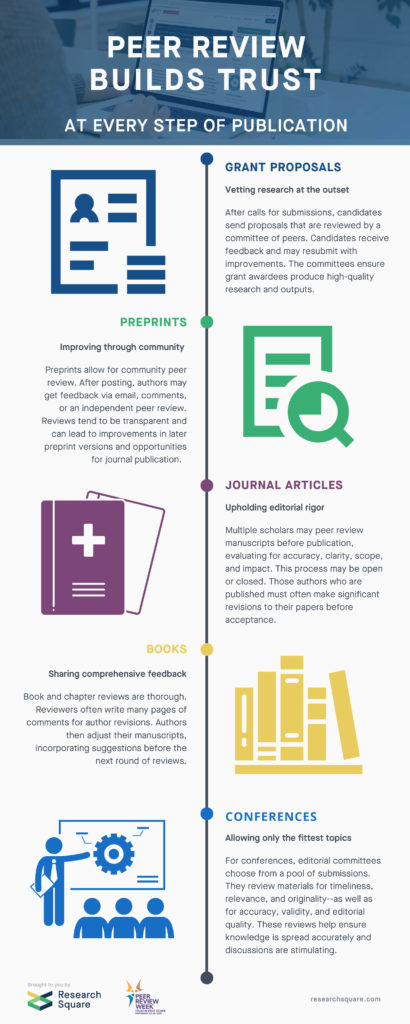Can you trust peer review?

Can peer review be trusted
Peer-review is by no means perfect. It is itself subject to bias, as most things in research are. Evidence from a peer-reviewed article does not make it reliable, based only on that fact.
Can you trust peer-reviewed journals
Even if everything is done properly, peer review is not infallible. If authors fake their data very cleverly, for example, then it may be difficult to detect. Deliberately faking data is, however, relatively rare. Not because scientists are saints but because it is foolish to fake data.
Should I accept peer review
Reviewers often find themselves swamped with multiple review requests at a time. While accepting peer review requests can boost a researcher's reputation and career progress, it is important to understand that, at times, turning down a request may be a better decision.
What are the risks of peer review
The peer review process can lead to litigation when physicians challenge the validity of disciplinary hearings or are denied privileges. Strict adherence to good processes can reduce the risks. Patients also can sue for negligent credentialing. Conflicts of interest must be avoided.
Do peer reviewers make mistakes
People make mistakes.
Even if every person involved in the publication of a manuscript catches 99% of all errors, it's still possible that some errors will go unnoticed. This likelihood of course goes up when authors/reviewers are careless, but it can never be eliminated entirely even with very meticulous review.
What are the negatives of peer review
Con: Peer reviews can create confusion
Being reviewed by peers means that one person will no longer be evaluating someone's performance. While the goal is to create more balanced, accurate feedback, the downside is that multiple reviewers can cause confusion. People may get clashing feedback.
Do peer-reviewed articles have bias
Peer review is vital for ensuring the academic and editorial quality of published articles and books. But it is far from perfect. Bias in the peer review process is well known, much discussed and, unfortunately, difficult to identify due in part to the anonymity of the reviewers (and sometimes the authors).
Does peer-reviewed mean anything
A peer-reviewed publication is also sometimes referred to as a scholarly publication. The peer-review process subjects an author's scholarly work, research, or ideas to the scrutiny of others who are experts in the same field (peers) and is considered necessary to ensure academic scientific quality.
What is the downside of peer review
Con: Peer reviews can create confusion
Being reviewed by peers means that one person will no longer be evaluating someone's performance. While the goal is to create more balanced, accurate feedback, the downside is that multiple reviewers can cause confusion. People may get clashing feedback.
What is better than peer review
Editorial Control
As an alternative, the publisher can rely on an editorial process whereby experts recommend which works to publish. The editors act as a filter, selecting the materials to publish and often working with authors on the details of their work.
Does peer review mean anything
A peer-reviewed publication is also sometimes referred to as a scholarly publication. The peer-review process subjects an author's scholarly work, research, or ideas to the scrutiny of others who are experts in the same field (peers) and is considered necessary to ensure academic scientific quality.
Can peer review be rejected
Many papers that reach the review stage are rejected because although their hypothesis is clear and the study is well designed, the conclusions made do not have enough data to make the case. Perhaps the sample size or patient data set is too small to yield statistically significant results.
Does peer review prevent bias
A study suggests that early career researchers tend to prefer double-blind peer review as it can reduce bias against authors with less experience, female authors, or authors from minority groups.
Is peer-reviewed biased
Conceptually, the peer review process can lead to distortion of the results from the viewpoint of the evidence user, akin to bias. Peer review bias can be defined as a violation of impartiality in the evaluation of a submission.
Does peer-reviewed mean unbiased
A: When an article is sent out to other experts in the field (peers) for review, and those experts agree that the article is worth publishing, then that is a peer-reviewed article. It is held to a higher standard and is more reliable than opinion or advice articles. It is not a guarantee of accuracy or lack of bias.
Is peer review blind
Peer review may be “single-blind,” in which reviewers are aware of the names and affiliations of paper authors, or “double-blind,” in which this information is hidden.
What are the criticisms of peer review
Research on peer review is not particularly well-developed, especially as part of the broader issue of research integrity; often produces conflicting, overlapping or inconclusive results depending on scale and scope; and seems to suffer from similar biases to much of the rest of the scholarly literature [8].



